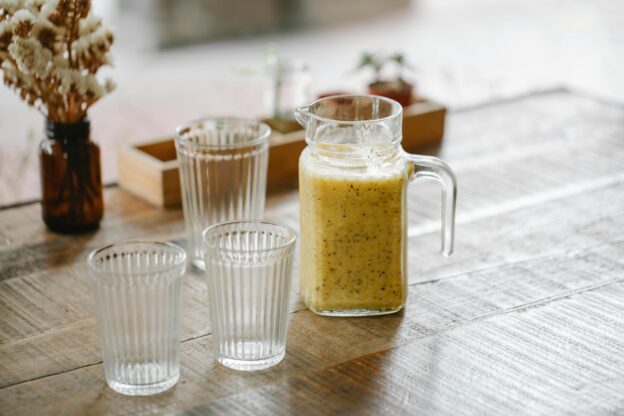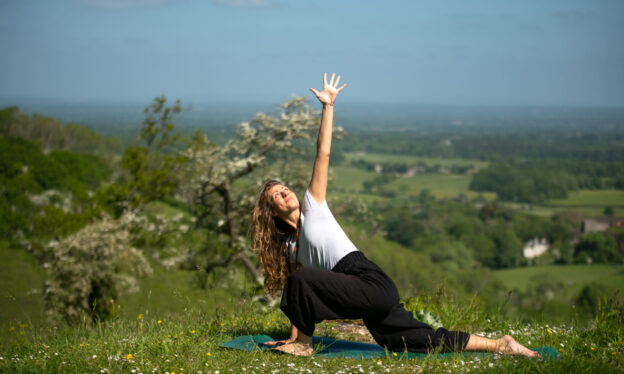As someone deeply engaged in holistic health practises, how do you personally define “healthy ageing”, and what role does nutrition play in this journey?
People often tend to blame their age for their poor health or their “aches and pains” but the truth is that healthy ageing is possible, and to me, it means being able to maintain the maximum level of functionality of our body and mind over the years. Health does not only mean the absence of disease but to have abundant vitality and feeling “in love” with life at any age.
This can be achieved, by following a healthy lifestyle that incorporates holistic practices like yoga and meditation, looking after our gut health, avoiding too much stress, exercising in moderation, prioritising sleep and doing more of what we love. Most importantly, nutrition plays a huge role in healthy ageing as by changing what you eat every day we can literally “bio-hack” our metabolism and achieve maximum health, versus driving disease through eating inflammatory foods.
One example of this is the impact that an anti-inflammatory, low-carb diet can have on keeping us free from disease or even reversing typical “age-related” illnesses like diabetes, osteoarthritis, or high blood pressure.
How has your expertise in yoga and nutrition intersected in supporting individuals through the phases of menstruation and menopause, promoting both physical and emotional well-being?
Our menstrual cycle is at the centre of women’s health and often ignore it. Each phase of the menstrual cycle (follicular, ovulation, luteal and menstruation) has a peculiar set of nutritional and movement-related needs that can allow us to navigate the cycle a lot better, avoiding the typical pre-menstrual symptoms and achieving physical and emotional wellbeing. One example of that is – did you know that women need 200 extra calories a day during the two weeks before menstruation? Ensuring to add that extra bit of nutrition every day (1 handful of mixed nuts, one small sweet potato) can really help with managing the sugar cravings that are so characteristic of the luteal phase and avoid unhealthy sugar binges.
Another example is how much more flexible we are in the second phase of the cycle because of the effects of progesterone on the ligaments. Knowing this allows me to advise my yoga students during that phase to not stretch “too deep” and avoid injuries.
Menopause has a totally different set of needs as well and it’s important to know where we are in our reproductive life phase so that we can act accordingly and prevent any health problems arising. Gut issues seem to be increasingly common nowadays.
What are some common signs or symptoms that indicate someone may be experiencing gut imbalances and how do you incorporate mindfulness and relaxation techniques into your practice to help alleviate these?
Any digestive problem is an indication that something might be wrong with your gut. Digestion should be easy and painless, and we should be able to tolerate a vast variety of foods without developing any gastrointestinal issues. When we experience bloating, erratic bowel habits, cramps or stomach burning, it’s a sign that our gut flora might be out of balance, that we might not be absorbing food very well and perhaps we have low stomach acid or inflammation in our gut.
Changing our diet is the first step in the process towards healing but it is not all – our nervous system also plays a huge part in allowing us to digest food properly! I often find that my clients are stuck in the “fight or flight” sympathetic part of the nervous system due to excessive amounts of stress, overworking culture or the presence of past trauma. When we are in fight or flight, the brain sends a message to the gut to “turn off” digestion as we don’t need it to survive. Over time, this leads to several digestive problems and is the reason why I often incorporate exercises to return clients back into the “rest and digest” parasympathetic state – the part of our nervous system where we feel safe enough to perform non-survival functions like secreting stomach acid and beginning digestion.
I often advise people to practice diaphragmatic breathing, yoga, or other relaxation techniques daily so that they can shift their “fight or flight” state to a “rest and digest” state and allow gut healing to take
place. Digestion and our nervous system are so interconnected that without relaxation, any dietary advice alone won’t work.
Could you share some favourite recipes or dietary tips that you recommend to your clients for supporting hormonal balance and their gut?
One of the most important things when it comes to supporting our hormones, is to begin the day with a sugar-balancing breakfast rich in fat, protein and fibre. I have come up with this delicious sugar-balancing smoothie when looking for a recipe that would keep me energised throughout the morning and at the same time feed my gut microbiome and be easy to digest.
The yoghurt in this smoothie acts as a source of fat, slowing down the absorption of sugar and nourishing the hormones as well as replenishing the gut flora with the anti-inflammatory “good” bacteria Lactobacillus. Bananas contain a type of fibre called inulin that feeds those same bacteria, keeping your gut healthy. The berries are rich in antioxidants and the walnuts are a good source of protein. The seeds can be changed following the “seed cycling” method if you are still menstruating: flaxseeds and pumpkin seeds in the follicular phase and sesame and sunflower in the luteal phase. Each set of seeds contains the nutrients we need to nourish that particular phase of our cycle.
For 2 people:
2 bananas
1 big handful of walnuts
1 tbsp of flaxseeds
1 tsp of chia seeds (optional)
3 tbsp of full-fat natural yogurt
½ glass of plant milk of your choice
1 handful of blueberries/raspberries
And, for women who are going through the menopause, the elénzia MENOPAUSE™: AM menopause sachets are an incredibly nutritious addition to give sustenance in a busy morning and reduce some of the difficult symptoms that might appear in that phase, such as hot flushes.
In your experience, what are some common misconceptions or myths about menopause and healthy
ageing that you often encounter, and how do you address them through your work as a nutritional therapist, yoga teacher, and menstruality mentor?
Often people think that going through the menopause is going to be this incredibly unpleasant experience and they feel scared about it. The same misconceptions can be applied to ageing as often people think that illness is going to be unavoidable in our old age. As a holistic health practitioner, I know that this is not true and that when you put yourself at the forefront of your worries and pay attention to your diet, movement, mental wellbeing and your cycle, there is no reason why menopause and ageing should be a difficult experience. Of course, this requires shifting your priorities at the same time.
As women, we are compassion experts, but we are not very good at self-compassion. If we understand the importance of taking care of ourselves to avoid illness, then we can change things around us and make arrangements to make this journey very easy. It all starts with putting ourselves first.
Finally, what advice do you have for individuals looking to improve their gut health and overall well-being through a holistic approach encompassing yoga, nutrition, and menstrual awareness?
To support your gut health and overall well-being, one of the most important things (nutritionally speaking) is to keep processed food and sugar to a minimum. These foods often drive inflammation – which eventually speeds up ageing. Follow a diet that is prevalently plant-based but with plenty of oily fish for its wonderful anti-inflammatory properties, Plenty of leafy greens, and maintain a good variety of vegetables and fruit — eating all the colours of the rainbow.
I would advise everyone to regularly practice a discipline that allows them to rebalance their nervous system and spend more time in that “rest and digest” state as opposed to “fight and flight” such as many different types of yoga, breathing exercises and meditation. We need to bring some form of yoga into our lives to ensure healthy ageing – and not just for the benefit of the mind but also to maintain a well-functioning body.
In terms of being in tune with our menstrual cycle, practising menstrual cycle awareness is the first step: being aware of which phase of the cycle you are in and scheduling your life around it. For example, we might feel more social around ovulation and we may want to retreat during menstruation – remember that, mark your cycle on your diary and know when to say yes to social events and when to decline and opt for a snuggly night in. These simple changes can have a huge impact on our well-being.
When approaching menopause, you almost need a full clear-out of your schedule. In that case, making others around you, especially your family, aware of what is going on for you, would allow you to be fully supported to spend as much time for yourself as you need. I believe that healthy ageing is possible when we put ourselves and our health first!
Where to find Vera:
Official Website | Instagram
Continue reading →



